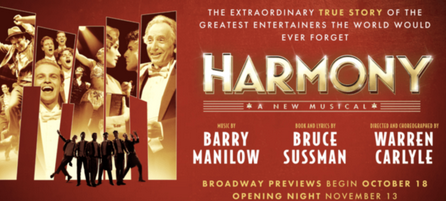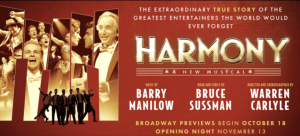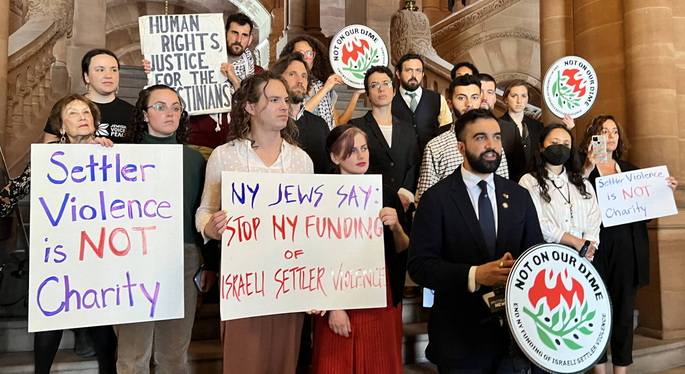A musical troupe of six young men known as the Comedian Harmonists became an international sensation in the 1930s pre-WWII Germany, a favorite of the German SS and Hitler, anointed as “Ambassadors of Good Will” on “diplomatic tours” from Copenhagen’s Tivoli Gardens to New York’s Carnegie Hall, until the Reichminister declared them “degenerate” (the Nazi term for immoral art).
Why? Because three members were Jewish and the pogrom had begun.
The all-male ensemble, a precursor “Backstreet Boy band,” rose from singing in subway tunnels to the biggest theatres, performing antics with harmony from German folk songs to Dvořák. Initially following a more straightforward style, a costume disappearance forces them to improvise wearing undershorts and delivering vaudevillian operatic comedy (“How Can I Serve You Madam?”) as waiters serving a VIP couple and pouring water on the gentleman diner’s head. Think slapstick Marx Brothers.
In astonishing acapella in another number, they mimic an entire orchestra of trumpets and strings in an imagined Franz Liszt composition (Hungarian Rhapsody #20). That turns into a high-kicking horah with Harry balancing a chair on his chin.
My personal favorite – that keeps ringing in my ears – is Come to the Fatherland, where the sextet, now facing the tyranny of Fascism, mock the Reich while on promotional tour in Denmark, wearing lederhosen and hanging from puppet strings suspended from the ceiling, and turning around to display their backsides.
Besides laughter and gasps from the audience at all the perfect moments as the humor and drama unfolds their bittersweet story, tears stream down many faces watching hate pollute such a beautiful tale that is all-too-prescient in today’s troubled times.
“I was in tears in the first 15 minutes with heart-wrenching moments that felt so personal to me,” said a friend. “The fact that it’s a true story is so powerful.”
Another friend who “wept throughout the whole second act” said, “It had just the right balance of sweetness to bring you out of the heart-wrenching truth and bearing witness.”
Everything about the show is “off the charts” brilliant.
“Excellent staging, music, orchestra, special effects, characterizations, stunning message,” gushed my Smith College classmate.
Their story is for all ages, figuratively and literally.
“My eyes are open for the first time to this time in history and I am thinking about what I can do in my time,” said one of my many students in my class at Columbia University Teachers College on “Psychology and the United Nations” whom I brought to see the show.
“The title is so appropriately Harmony, for what we need in this world,” said another young student. “Despite the horror, there is so much love in the story.”
One of my favorite messages from the plot is to ACT. As Albert Einstein (played by Chip Zien) famously proclaims in a scene when he attends the group’s Carnegie Hall concert: ‘The world will not be destroyed by those who do evil, but by those who watch them without doing anything.’
Apparently, I’m not the only one, as Harmony writer Bruce Sussman says that line evokes more audience reaction than he ever expected, hitting home, he suspects, for today as it did decades ago when pronounced.
In a related dramatic moment, actor Chip Zien – also playing the role of the aged Rabbi (and many other parts) — berates his younger self for not seizing the moment to assassinate Hitler on a train when he could have “changed history forever”.
As the narrator, Zien, who created the role off-Broadway, is a Tony award-worthy tour-de-force,
The message that a decision changes your life forever (so powerful to me, as I think of Robert Frost’s poem, “The road not taken”) rings out in another gripping scene where the group debates whether to return to their native Germany or stay in America despite suspecting trouble. Returning “home” brings their downfall at the hands of the Nazis. The choice is a stark reminder that everyone has regrets (vividly in Frank Sinatra’s famous line “regrets I have a few” in the tune “My Way”) but you cannot turn back, only go forward.
Characters keep hoping – fruitlessly – things will change.
Another of my favorite truisms – as a psychologist — is also uttered by Einstein: “In every difficulty there is an opportunity.”
Yet another message that goes beyond the scope of the simple line is delivered when the group is debating what to call themselves, and one of them implores, “Let there be harmony where there is discord.”
The story of the musical’s road to Broadway is astounding. Legendary Tony, Grammy, and Emmy Award® winner Barry Manilow wrote the original music, spending thirty years with his good friend Bruce Sussman (who wrote the book and lyrics) developing the project. The two have had a fifty-year-long collaboration that has produced over 200 songs and earned multiple Grammy Awards. Beloved Barry proudly publicly announces his age as 80. Imagine throughout his storied career, with 85 million records sold, 50 top-40 hits, singing the songs the whole world sings, and even breaking Elvis Presley’s record for the most shows (637) performed in Las Vegas, Manilow considers Harmony the most rewarding creative experience.
That specialness for Barry is evident in this real-life story he tells at an event I attended. The real-life Rabbi, Polish-born Roman Cycowski – who bemoans outliving all his bandmates — ends up moving to California with his wife Mary, becomes a cantor, and dies in 1998 at age 97. The others died earlier. Despite their sinking into once-oblivion, two documentaries tell the Comedian Harmonists’ story, it’s now all over the internet and in resurgence with tribute groups.
But during life after the group broke up, few knew the Rabbi’s past when he and Mary end up living in California, not even Barry Manilow himself, who in the midst of developing the show – unbeknownst to him –walked his dog every day past the Rabbi’s very house in his same neighborhood in Palm Springs! Incredible.
On opening night on November 13, with my best friend, international musician Russell Daisey, the show was electric the audience electrified and the talent overbrimming. On stage after the performance, Tony-award-winning Director and choreographer Warren Carlyle (The Music Man, Hello Dolly!) said the show has been the highlight of his career.
Everyone in the show told me it’s so meaningful.
That the story is true is as powerful for the actor as for the audience. In the Copacabana-esque nightclub scene, my dear friend Allison Semmes, playing the iconic Josephine Baker, delightfully swings pink-feathered hips to “We’re Goin’ Loco!” at a concert with the group. Elites of the times send congratulatory telegrams, including Will Rogers and Fanny Brice. The group even performs (behind the scenes) for Marlena Dietrich.
“It’s the biggest honor to play the iconic Josephine Baker,” Allison told me. She would know, as in her stellar career, she has played other iconic Black singers, like Diana Ross in Motown.
Her mom told me — when I met her lovely parents at the opening night party — that they knew she’ d be a star since their little girl had been singing since she was a tot, pushing around the vacuum cleaner!
The tragedy of the story is palpable in scenes of the historical backdrop of the struggling revolution, with Julie Benko’s Jewish-Bolshevick character Ruth waving flyers and holding high a torch imploring “Rise Up” comrades, amidst protesters racing across the stage waving signs of “Freedom” and “Down to Fascism.” Benko was just a New York Times Breakout Star as Fanny Brice in Funny Girl.
In the story, activist Ruth marries “Chopin” – the pianist who previously played brothels who names himself for his classical music muse – but their interfaith union is doomed. In one marital fight, Ruth chastises Chopin, ‘You married a Jew in this Jew hating country and you won’t stand up to them [the Nazis].”
Rabbi and Mary have a happier ending. Mary initially rejects Rabbi’s proposal out of fear their interfaith marriage will be difficult, worrying, “the two of us can’t make it in this world”. Looking out her window as she sews, she observes, “I look out at a world falling apart.” But deciding to convert and follow her heart, Mary quotes a verse from the Bible and declares, “God is where you find him.” The marriage of the real-life Rabbi and Mary survives decades.
The love stories are particularly poignant in show-stopping numbers, with the Rabbi declaring his never-ending love to overcome Mary’s reluctance, singing his heart out – to audiences’ thundering applause – in an endearing ballad that he will love her “Every Single Day” of his life.
Equally breath-taking is the two women confirming their courage to marry their out-of-faith affirm their love choices, in a heartfelt duet “Where you go.”
“Where you go, I will go. Where you walk, I’m beside you. My love, where you are is where I want to be…No journey can erase that place in both our hearts. Where you go, I will go. Where you lie, so will I. And I’ll stay till the day that we die.“
Scenes are heartwarming and also startling. When the two couples are marrying under the traditional chuppah, just as the glasses are crushed underfoot in the traditional ritual, a protestor smashes the synagogue glass.
Later, we are startled again as the Obersturmführer reads a list of names of those denied rights on the basis of religion.
The horror of Nazism stands in stark contrast to the charm of the group, as when they enact telling Erich’s parents he is becoming a singer when they want their son to become a doctor. After all, his rich family runs in elite circles, and Austrian composer Johann Strauss gave him his first piano lesson. A line in the show reminds us, “Music is the medicine of the soul.”
The parallels and relevance of the story to the current Israel-Hamas war are palpable. And while the story addresses antisemitism (dramatically on the rise today) just as in the previous Broadway shows (Parade and Leopoldstadt) and the currently running “Prayer for the French Republic,” as one theatre-goer proclaimed, “The message is about how we have to denounce hate of all kinds towards all people, and learn to love.”
Sadly, the only surviving descendants of the group are the grandchildren of Erich Collin whom I was delighted to meet at the opening night party. The grandson, who lives in California told me his granddad, sadly, spoke little of his past, and died when he and his New Yorker sister –- were young.
Five of the six “boys” are making their Broadway debut (except Zal Owen who plays Harry Frommermann): Danny Kornfeld as the young Rabbi (Roman Cycowksi), Eric Peters as Erich A. Collin, Blake Roman as Chopin (Erwin Bootz), Sean Bell as Bobby (Robert Biberti), and Steven Telsey as Lesh (the Bulgarian Asparuh “Ari” Leschnikoff, who announces proudly that his country saved every last Jew). All have scene-stealing moments that presage stellar careers. All thank their parents and family for their support.
Parental pride was overbrimming when I encountered Danny Kornfeld (young Rabbi) with his family after a show, at the post-Broadway hangout, the Glass House.
That night I had brought my dear friend, His Excellency Sidique Wai, Ambassador of Sierra Leone to the United States for whom I serve as policy advisor, who loved the show. How serendipitous to discover the small world that Allison Semmes has heritage in Sierra Leone! Two of my students, David Perls and Emily McGill were also at that performance; in the Teachers College Mind, Body Spirit Institute, they were deeply moved by the play and performances.
I saw the show many times, enjoying it more and more each time, treating groups of friends, students, and UN Ambassadors at every opportunity. One big gathering capped a big celebration at the 3 West club where I was honored with a New Zealand Maori Korowai cloak when inducted into the Global Leadership Council of the eMental Health International Collaborative (eMHIC) founded by my friend Anil Thapliyal.
My guests who came to the show who loved it included Ambassador Dónal Cronin of the Mission of Ireland to the United Nations, Ambassador Chola Milambo of the Mission of Zambia to the United Nations and his wife Cecilia and Chernor Bah, Minister of Information and Civic Education for the Republic of Sierra Leone, Ambassador James Larsen of the Mission of Australia to the UN with his wife Antoinette, and my good friend famous actor Holt McCallany who is a well-known actor,
At the stage door, the cast was always so accessible, talking to fans, taking photos and signing programs. Chip Zien signed the program after the show with my students Emma Gaskins, June Chang and Melissa Clark.
Julie Benko (Ruth). Blake Roman (Chopin) and Danny Kornfeld (young Rabbi) and Andrew O’Shanick (Standradenfurher spent time saying hello to them and Niklas Nyblom.
Many of my students – from diverse international backgrounds from Sweden/Japan to Costa Rica, China, South Korea, and Kazakhstan — were so entranced by the performance, they wanted to come again.
“I am so moved by this story,” said one student, “Professor Judy Kuriansky is a role model for us about how to make a difference in the world while respecting everyone and working towards the United Nations Sustainable Development Goals of mental health and well-being and also about peace. I resonate so much with this story so that I am even more committed as she wants us to do – and as she does — to make a difference in this world.”
“Even though I’m young and come from such a different background and time than these characters, I can totally relate,” said another. “I’ve heard that phrase, ‘Never again.’ We have to make peace in this world.”
Many you had heavy conversations about hopelessness versus hope, democracy versus dictatorship and demagoguery.
But mostly there were exclamations of “What a beautiful story” “Such outrageous energy” “So much heartbreak but so heartwarming.”
The songs were so memorable that at an after party with my students at the Glass House (a Broadway after-show hangout) that I hosted, Jiantingyue (Chris) Huang stood up, clinked his glass and made his first-ever toast, poignantly quoting “This is Our time”— the love song the Rabbi serenades to his beloved Mary that becomes a show theme.
Prominent producer Ken Davenport (A Beautiful Noise: The Neil Diamond Musical, Spring Awakening, Kinky Boots) created the most innovative promotions for the play and even a framed photo of “Stars in the Night” for investors like myself. The photo counterpoints the lines characters utter: “The whole damn world is turning to sh_t”, “Surely this is the end of the world” and “God is dead.” The brilliant song “Stars in the Night” ends the musical on an uplifting note as starlights descend on the cast on stage.
“Look! Look how they tease, these stars in the night. The darker the night becomes, the brighter their light becomes.”
Be sure to see this magnificent show before it closes February 4. Ethel Barrymore theatre, 243 West 47th Street. Tickets for remaining performances are available starting at $59 via www.telecharge.com or by calling (800) 447 7400 or (212) 239-6200
www.harmonyanewmusical.com
www.facebook.com/harmonythemusicalofficial
www.instagram.com/thecastofharmony













